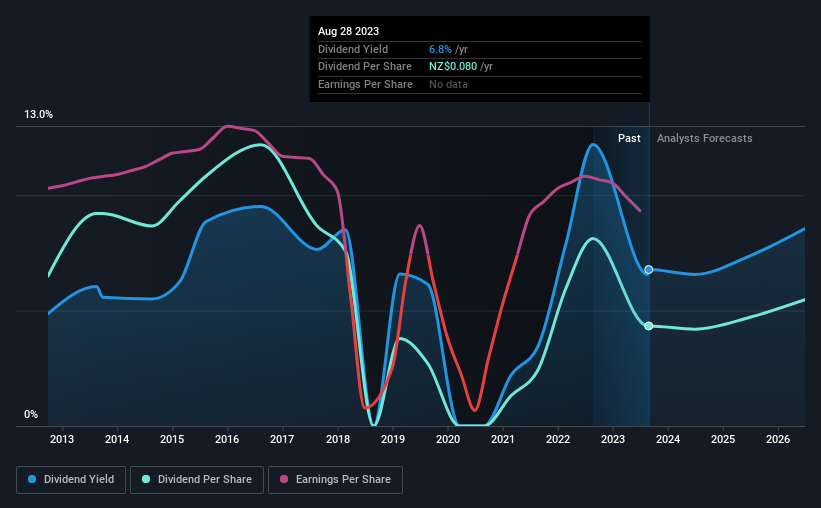- New Zealand
- /
- Metals and Mining
- /
- NZSE:STU
Steel & Tube Holdings (NZSE:STU) Is Paying Out Less In Dividends Than Last Year

Steel & Tube Holdings Limited (NZSE:STU) has announced that on 22nd of September, it will be paying a dividend ofNZ$0.0471, which a reduction from last year's comparable dividend. The yield is still above the industry average at 6.8%.
Check out our latest analysis for Steel & Tube Holdings
Steel & Tube Holdings' Dividend Is Well Covered By Earnings
We like to see robust dividend yields, but that doesn't matter if the payment isn't sustainable. Prior to this announcement, Steel & Tube Holdings' dividend made up quite a large proportion of earnings but only 14% of free cash flows. In general, cash flows are more important than earnings, so we are comfortable that the dividend will be sustainable going forward, especially with so much cash left over for reinvestment.
The next year is set to see EPS grow by 37.1%. If the dividend continues along recent trends, we estimate the payout ratio will be 60%, which would make us comfortable with the sustainability of the dividend, despite the levels currently being quite high.

Dividend Volatility
The company's dividend history has been marked by instability, with at least one cut in the last 10 years. The annual payment during the last 10 years was NZ$0.12 in 2013, and the most recent fiscal year payment was NZ$0.08. Doing the maths, this is a decline of about 4.0% per year. A company that decreases its dividend over time generally isn't what we are looking for.
Dividend Growth Could Be Constrained
Growing earnings per share could be a mitigating factor when considering the past fluctuations in the dividend. We are encouraged to see that Steel & Tube Holdings has grown earnings per share at 59% per year over the past five years. EPS is growing rapidly, although the company is also paying out a large portion of its profits as dividends. If earnings keep growing, the dividend may be sustainable, but generally we'd prefer to see a fast growing company reinvest in further growth.
In Summary
Overall, the dividend looks like it may have been a bit high, which explains why it has now been cut. In the past, the payments have been unstable, but over the short term the dividend could be reliable, with the company generating enough cash to cover it. This company is not in the top tier of income providing stocks.
Market movements attest to how highly valued a consistent dividend policy is compared to one which is more unpredictable. Meanwhile, despite the importance of dividend payments, they are not the only factors our readers should know when assessing a company. Taking the debate a bit further, we've identified 2 warning signs for Steel & Tube Holdings that investors need to be conscious of moving forward. Looking for more high-yielding dividend ideas? Try our collection of strong dividend payers.
New: Manage All Your Stock Portfolios in One Place
We've created the ultimate portfolio companion for stock investors, and it's free.
• Connect an unlimited number of Portfolios and see your total in one currency
• Be alerted to new Warning Signs or Risks via email or mobile
• Track the Fair Value of your stocks
Have feedback on this article? Concerned about the content? Get in touch with us directly. Alternatively, email editorial-team (at) simplywallst.com.
This article by Simply Wall St is general in nature. We provide commentary based on historical data and analyst forecasts only using an unbiased methodology and our articles are not intended to be financial advice. It does not constitute a recommendation to buy or sell any stock, and does not take account of your objectives, or your financial situation. We aim to bring you long-term focused analysis driven by fundamental data. Note that our analysis may not factor in the latest price-sensitive company announcements or qualitative material. Simply Wall St has no position in any stocks mentioned.
About NZSE:STU
Steel & Tube Holdings
Engages in the distribution and processing of steel products in New Zealand.
Flawless balance sheet and good value.
Market Insights
Community Narratives



